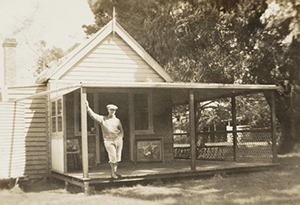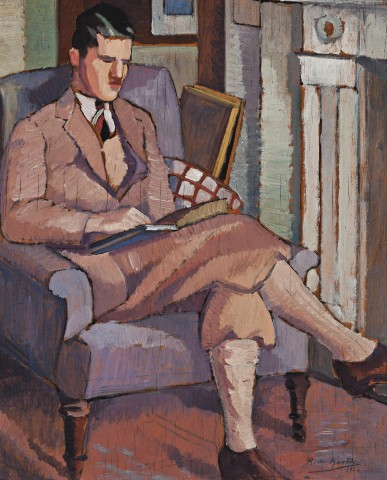MAN READING (PORTRAIT OF G. DAVIS), 1926
ROY DE MAISTRE
oil on plywood on composition board
45.5 x 37.0 cm
signed and dated lower right: R. de Mestre / 1926
John Young, Sydney
Thence by descent
Mrs John Young, Sydney
Leonard Joel, Melbourne, 18 November 1965, lot 229 (as ‘Portrait Study’)
Ken and Joan Plomley Collection of Modernist Art, Melbourne
Johnson, H., Roy de Maistre: The Australian Years 1894-1930, Craftsman House, Sydney, 1988, pl. 14, pp. 48 (illus.), 49, 121
In late 1925, Roy de Maistre returned to Australia after two-and-a-half years’ study in Europe following his award of the Society of Artists Travelling Scholarship. Prior to this, he had already been identified as one of the country’s leading modernist artists through his own theories on the harmonious relationships between colour and music, and had undertaken further studies with the ‘tonalist’ Max Meldrum. On his return to Sydney, de Maistre took a studio in Burdekin House in Macquarie Street, a grand colonial mansion sadly destined for the wrecking ball. Once ensconced, he set about re-establishing his position in the local art scene dedicating himself to his art, and to the cross-over possibilities between modernism and interior design. Man Reading (Portrait of G. Davis), 1926, dates from the first year of de Maistre’s return to Australia and in it is evidence of many of the artistic directions that his art was now taking.
DH1797 Cat19AUG v1.jpg

SUTTON FOREST, NSW, MARCH 1926
Sydney
Apart from his name, the identity of the sitter is unknown but he could almost be a stand-in for the artist who was himself an avid wearer of the distinctive ‘plus fours’ outfit. The location is de Maistre’s studio, identifiable by the distinctive fireplace mantelpiece and the armchair, which was upholstered in a rich floral jacquard fabric. These elements feature in two other notable paintings by de Maistre, Studio, Burdekin House, 1928 (location unknown), and the vibrant At Burdekin House Studio, c.1928, formerly in the collection of John Young, the influential Director of Macquarie Galleries. Additional identification for the location is provided by two of the artist’s paintings neatly stacked to the left of Davis’ shoulder. There are many numbers of paintings featuring a person with a book and this subject has been interpreted as reflecting the rising status of reading amongst the middle classes.1 Similar examples amongst de Maistre’s modernist peers include Grace Cossington Smith’s The Reader, 1916 (Art Gallery of New South Wales, Sydney) which utilised her sister Diddy as the model; Roland Wakelin’s Man Reading, 1933 (Collection of John Wakelin); and Margaret Preston’s The Studio Window, 1906 (National Gallery of Australia, Canberra), depicting a woman reclining on a lounge reading a magazine.2
Man Reading (Portrait of G. Davis) is a fine example of de Maistre’s contemporaneous ideas, from the sculptural planes defining the sitter’s face and hands, to the rhythmic application of single brushstrokes running down the mantelpiece and delineating Davis’ clothing. The use of plywood as a support was also a recognisable modernist statement, being a recently developed industrial material that spoke volumes to like-minded artists engaged in interpreting life in the rapidly changing twentieth century.
1. See: Johnson, H., Roy de Maistre: The Australian Years 1894-1930, Craftsman House, Sydney, 1988, p. 49. Johnson also argues that it creates a ‘distancing’ device between de Maistre and his subject
2. There is a photograph of an almost identical study of ‘Davis’ in the collection files pertaining to de Maistre in the National Gallery of Australia’s archives.
ANDREW GAYNOR
